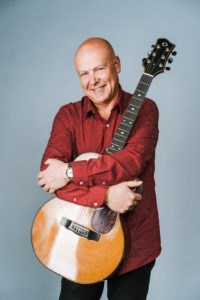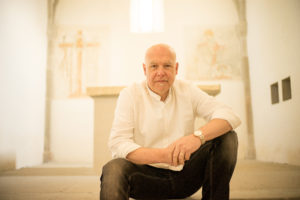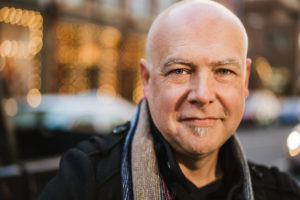For Christians from a variety of traditions and places, many of singer/songwriter Brian Doerksen’s songs are lodged deeply in our hearts. They’re like familiar, welcome signposts along a favourite country road. In fact, it’s difficult for many of us to even think about some of the tunes the Juno Award winner has given us, such as Faithful One, Refiner’s Fire, and I Lift My Eyes Up, without breaking into song. So when Doerksen, who is also a teacher, author, conference speaker and pastor, recently emailed us to say that he would soon be passing through Calgary, my husband and I jumped at the chance to take him out for a mid-morning coffee and a bite to eat. We wanted to hear the stories behind his two latest musical projects: a collection of brand-new arrangements of his most popular songs, and his very first Christmas album.
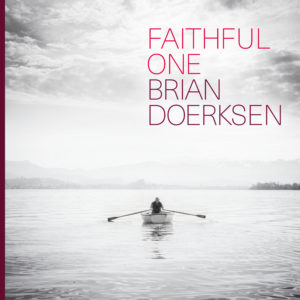 After settling in at the café, we talked about the release earlier this year of FAITHFUL ONE, Doerksen’s album of new arrangements of many of his “legacy” songs. Not too long ago, Doerksen and his wife Joyce realized that as he was hitting the 30-year mark of songwriting and recording, many of his older CDs were going out of print. He also recognized that he didn’t have a recording of some of those older songs that he felt he could live with for the next ten to twenty years. The song Faithful One, in particular, kept coming to mind. As Doerksen put it, he can “barely stomach” some of his older songs, but Faithful One doesn’t fall in that category – it’s a song he can still sing with all his heart.
After settling in at the café, we talked about the release earlier this year of FAITHFUL ONE, Doerksen’s album of new arrangements of many of his “legacy” songs. Not too long ago, Doerksen and his wife Joyce realized that as he was hitting the 30-year mark of songwriting and recording, many of his older CDs were going out of print. He also recognized that he didn’t have a recording of some of those older songs that he felt he could live with for the next ten to twenty years. The song Faithful One, in particular, kept coming to mind. As Doerksen put it, he can “barely stomach” some of his older songs, but Faithful One doesn’t fall in that category – it’s a song he can still sing with all his heart.
“I had the recording of Faithful One from our YOU SHINE album,” recalled Doerksen, “which we recorded live in Dublin in 2002 – that’s almost 20 years ago! I started envisioning it in my head with a string section, you know, and a bit more of an orchestra. So then we thought, okay, let’s record a new version of Faithful One…and I was really, really pleased with how it turned out.”
Audio of the song Faithful One:
(from Brian Doerksen’s new FAITHFUL ONE album)
The rest, as they say, is history – and the result is a gorgeous CD with 16 songs, most of which are beautiful “renewed versions” of tunes that his longtime fans will vividly recall. Doerksen also included the song How Long (Psalm 13), recorded by the band he is now a part of, The SHIYR Poets. Another highlight is the old hymn It is Well, which Doerksen sings with his father Harry, now in his 80’s (a reprise of their duet of the same song on the 2002 YOU SHINE album.)
Doerksen laughed as he told us that his wife often calls him her “fifth husband”.
“She has noticed, after 35 years of marriage, that about every seven years I go through some kind of change or metamorphosis,” he explained. “Brian 5.0 can’t sing some of Brian’s 1.0 and 2.0 songs anymore. But there are certain songs that came from Brian 1.0 that I can still sing, and many of those are on the new album.”
We had to ask what other ways Brian 5.0 differs from Brian 1.0. After some thought, Doerksen recalled his curly locks of hair – now gone.
“But I guess I’d say there are lots of other differences,” he went on. “Stepping more into the grand mystery. It’s more “I don’t know, but I trust” versus “I know”. It’s weathering some storms. It’s the reality of having special needs kids and walking with them for all of these years. It’s getting to the point where rather than trying to change certain things, you learn to deeply accept them… and not only accept them, but find you are grateful. To quote Richard Rohr, ‘Everything belongs.’”
Doerksen and his wife live in Abbotsford, B.C., in the house where he grew up. They have six children including two sons with Fragile X Syndrome, a genetic condition that causes developmental delays.
“It’s been difficult having special needs kids, but there came a point when I began to realize that my boys are a great gift to me,” said Doerksen. “They set the rhythm of our days because of who they are. Certain things about ‘organized religion’ don’t really work that well for them. If they are extremely agitated, then everything starts crumbling because we’re the ones who have to care for them. We have to go home with them after a long meeting, and we have to pick up the pieces for hours – sometimes days – to try and get them back into their equilibrium. After experiencing things like that, we started to think, ‘How about we walk in such a way that their rhythm sets our rhythm, and we learn to say no to things that we know our boys can’t handle.’ We accept that this imposes some limits, but you could also say that it provides a riverbank, and allows us all to flow in the same direction. That’s one of the things we’ve learned from our situation. When you’re younger, you have more determination to change the course of the river, so to speak, through your sheer energy and your vision of how you think things should be. Then eventually you start recognizing the wisdom in surrender.”
Our conversation led to a discussion about the many changes in our culture, our politics, our churches and our lives during the past 30 years.
“I think in our culture at large, it feels like there’s a lot more fear,” said Doerkson. “I think there is more of a demonization of those who are different than us. It almost feels like the church has become more divided between the ‘certainty’ crowd who seem to be saying that all we have to do is preach the gospel – and the word ‘gospel’ is code for their version of Scripture, which is getting narrower and narrower. And then there is another part of the church that is opening up to mystery, and ancient rooted things.”
Doerksen went through a painful five-year period when, as he puts it, he ‘lost his words’, was unable to create anything and felt worthless. He had to turn to things created by other people thousands of years ago, like the Psalms. The experience changed him in many ways.
“I know that in my younger years, I was really zealous for revival in Canada,” Doerksen recalled. “I now recognize that behind revivalism there often is an angry God. It feels more and more that we live in a time where, both politically and religiously, we mistrust people who are different than us. It’s too easy to use Scripture against ‘the other’, against somebody who’s different than me – a different religion, a different sexual orientation, a different way of life – we find the Scriptures that we can weaponize. But one thing I came to see quite a while ago, and still fully believe, is that there is an arc in Scripture, a direction of the story. And the arc of that trajectory is always towards inclusion, towards love, towards compassion. I’m trying to pull away way from language that doesn’t recognize that trajectory. Of course, having a special needs son who can’t talk, who can’t pray that Evangelical “Sinners’ Prayer”, who can’t do any of those things, has also shifted the trajectory of my life. I hope and pray that it shifted me more in line with God’s trajectory.”
Doerksen also remarked on the shift he is sensing in others.
“It’s like people of all faiths have begun to realize that we are always talking about heaven and hell and the next life, instead of caring for this beautiful world which we’ve been given. We speak as though we’re in charge, but the longer you walk this earth, you realize it’s all a great mystery. For too long we’ve been ignoring the peril all around us, in our climate and in nature. But, thankfully, I feel like that’s slowly changing.”
We then asked how he came to finally put together his first Christmas album this year, THE HEART OF CHRISTMAS. Doerksen laughed as he told us how record producers have been telling him for about fifteen years that he should make one, that it would sell well and make money – but he always declined, feeling that he wasn’t interested in hopping on that bandwagon. Plus, he admitted, he has never liked doing things just to be “like everybody else.”
A few years ago his wife Joyce said to him one day, “It’s time.” Even though it was the middle of summer, she went upstairs and got a box of Christmas decorations from the attic, set them up in her husband’s office, and told him to get to work. And he did.
“It seems that I had to go through that five-year period of worthlessness and pain, and then singing the Psalms, to gain a fresh perspective on the Christmas story,” said Doerksen. “Basically, I wanted to tell the story of Emmanuel – ‘God with us’. From my vantage point, I tried to share the truth that God is with all of us, the whole human race – not just with us and the people who are like us.”
Doerksen wrote almost 30 original Christmas songs, and then whittled them down. He originally set as his goal to have eight original songs and four cover songs in the album – but, because he kept finding different parts of the Christmas story he really wanted to tell, it ended up with thirteen originals and only two covers: Stille Nacht (Silent Night) and It Came Upon the Midnight Clear. Winnipeg musician Jaylene Johnson co-wrote two of the original songs with him.
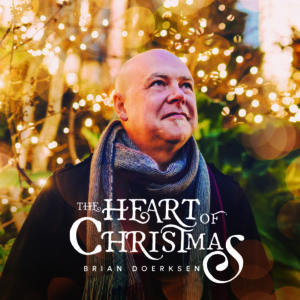 “I really wanted to say something about the humility of God,” said Doerksen. “I feel sometimes that the modern church is singing way too many ‘God is great’ songs, you know? It just seems that the language of greatness is the language of power and control and protecting what you have. I would never say that God isn’t great, but it’s like we’re putting the emphasis in the wrong place. When you look at Jesus, he didn’t come into the world with shock and awe. He came with service and humility and love, and – as I sing in the song Emmanuel, with healing and forgiveness, even for those on the margins, and even for his enemies. I also think we need to hear the voice of lament in the modern church. If we never hear that voice, then when we ourselves struggle and need to lament, we think something’s wrong with us. We figure that we must not be a good, victorious Christian…but even Jesus lamented! Suffering marks our common story, as a human race. It also marks God’s story, when we look at Jesus.”
“I really wanted to say something about the humility of God,” said Doerksen. “I feel sometimes that the modern church is singing way too many ‘God is great’ songs, you know? It just seems that the language of greatness is the language of power and control and protecting what you have. I would never say that God isn’t great, but it’s like we’re putting the emphasis in the wrong place. When you look at Jesus, he didn’t come into the world with shock and awe. He came with service and humility and love, and – as I sing in the song Emmanuel, with healing and forgiveness, even for those on the margins, and even for his enemies. I also think we need to hear the voice of lament in the modern church. If we never hear that voice, then when we ourselves struggle and need to lament, we think something’s wrong with us. We figure that we must not be a good, victorious Christian…but even Jesus lamented! Suffering marks our common story, as a human race. It also marks God’s story, when we look at Jesus.”
Audio of the song Emmanuel (God is Watching Us):
(from Brian Doerksen’s new THE HEART OF CHRISTMAS album)
We also asked him about the story behind the beautiful sounds of the Pacific Mennonite Children’s Choir, who sing along with Doerkson on Stille Nacht and The Second Noel.
“My wife was a part of that choir when she was young,” he replied. “They’ve been going for 40 years. I wanted to sing Stille Nacht in German, my parents’ mother tongue. Apparently I spoke a bit of German when I was a kid. So the whole idea really worked for me. I actually sent the finished version of the song to some German friends to ask them if I had pronounced everything okay and they said, “You did good.” That was great to hear, because I really didn’t want to mess it up.”
We noticed that Doerksen acknowledged in the album, through his song Saddest Season, that sometimes Christmas can be a depressing time for people. He wrote the song shortly after his mother passed away, six years ago.
“She died just a few weeks before Christmas, and that Christmas was very, very difficult,” explained Doerksen. “On the evening of that Christmas Day, after the day was done, I walked over to the piano. I was a wreck, and this song – Saddest Season – just tumbled out. So often we try and deny what my friend Carly Reirson once called, ‘a stain of grief on our celebration’. This song is expressing that tendency, which is why I invited Carly to sing it with me on the album. She lost her mother to cancer, and her mother was also the heart of Christmas in their family. She listened to the demo of the song, and I invited her to sing it with me as somebody else who loves Christmas, and who struggles with Christmas.”
Doerksen spent a number of years commuting to Prairie College in Three Hills, Alberta to teach young aspiring songwriters, musicians and worship leaders. He recently has been mentoring songwriters at retreats and workshops, and is exploring the idea of developing an online songwriting course. Doerksen explained that teaching is in his DNA, since both his parents were educators. We asked him if the experience of teaching has been transformative in his life.
“Every time I get the opportunity to teach, I learn from both sides of the process,” he replied. “I enjoy the journey of discovery in the preparation and research. Then the time with people sharing and listening – I find lots of revelation there as well. I go in knowing that I can learn something from all my students. So this whole process is definitely transformative for me and has continued to be so. I think my mother modelled for me a ‘child-like wonder’ – as a kindergarten teacher herself, she embodied the saying that ‘everything you need to learn, you learn in kindergarten’. From my Dad, who was a science teacher, I got a deep curiosity about how things work. He loved the whole science experiment thing. So one of the things I’ve loved to do is to reverse-engineer the songwriting process, so that I can help other songwriters write better songs that are uniquely theirs to write.”
As our time together came to an end, we asked Doerksen what he thought about the latest crop of young songwriters. Doerksen was as generous and eloquent as ever in his answer.
“The upcoming generation of songwriters are releasing some great new expressions,” said Doerksen. “Some of this comes out in the subjects they are writing about – for example, songs about injustice, earth care and new scientific discoveries. I find groups like ‘The Brilliance’ really inspiring that way. But like my generation of songwriters and those that came before me, the next generation is also in the same process of learning the craft and discovering their signature style. So new expressions, yes – yet the process remains the same. It’s always this blend of inspiration plus the discipline to learn the craft. There are no shortcuts on this journey. We can’t over-spiritualize it either, because God doesn’t give us songs – God gives us seeds. What happens to those seeds depends on the quality of soil into which they fall. We have a vital part to play even as we depend on God for inspiration. In the end the songs sound like us – and they should – yet they also express something of the One who inspired them.”
Check out Brian Doerksen’s website to find out more about his touring schedule, other events, his blog, and to purchase his albums.
You can also follow him on Facebook, Twitter or Instagram.
Photos courtesy of Brian Doerksen.


